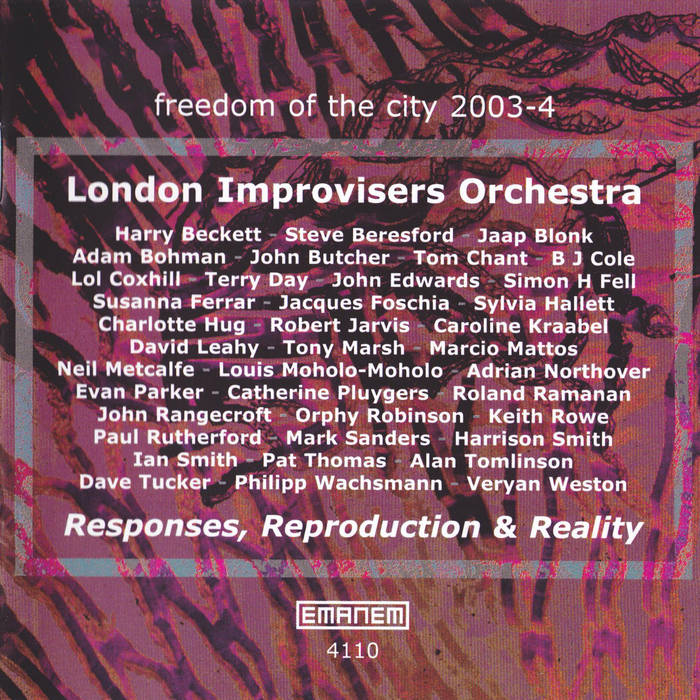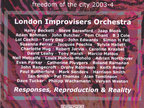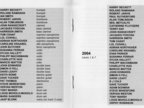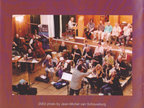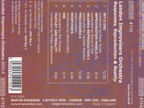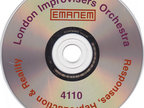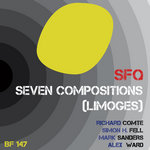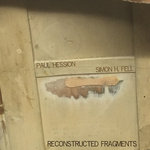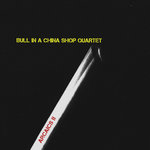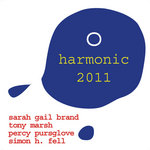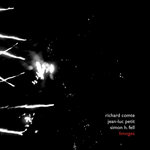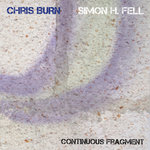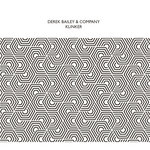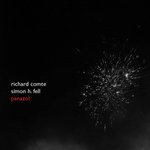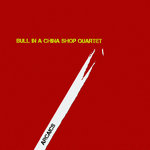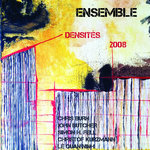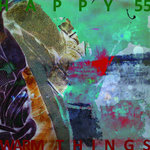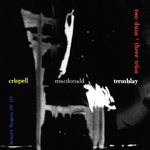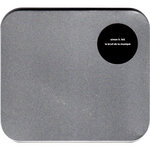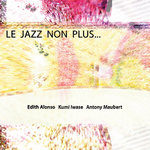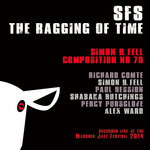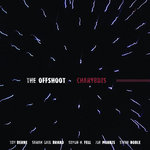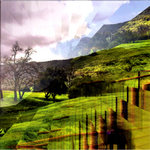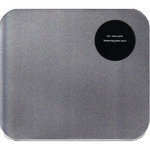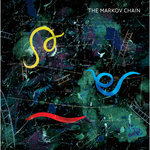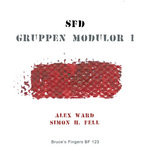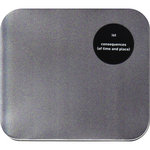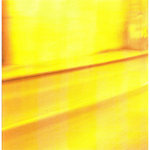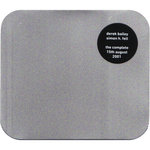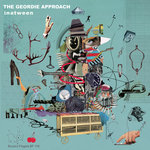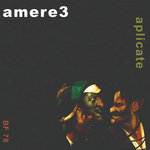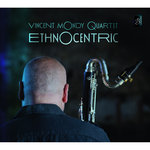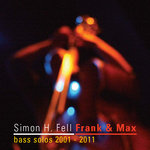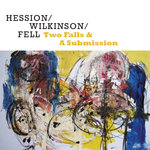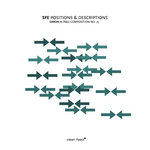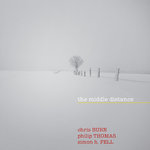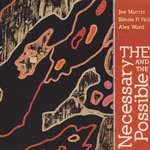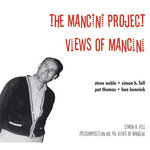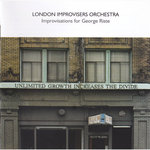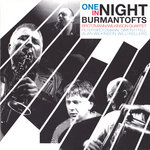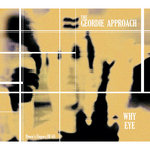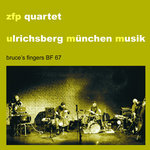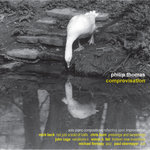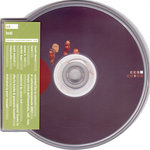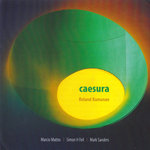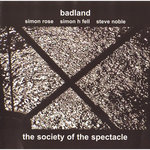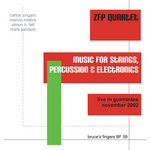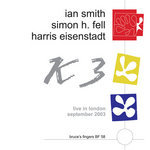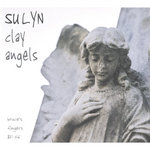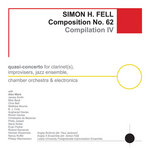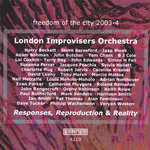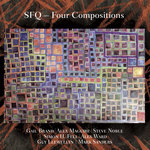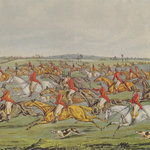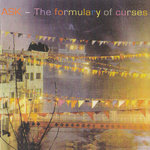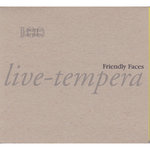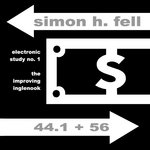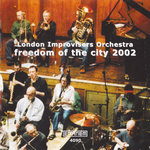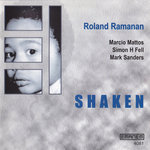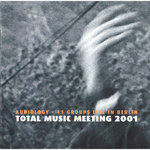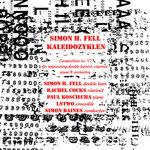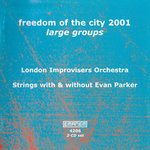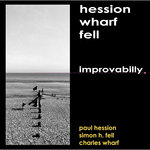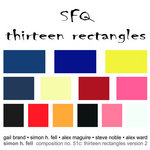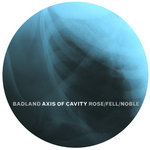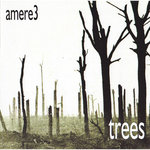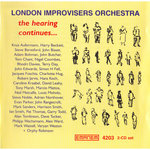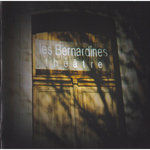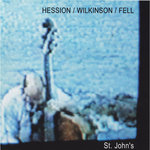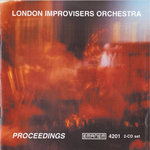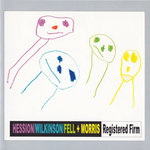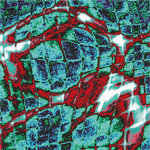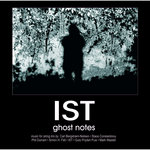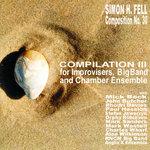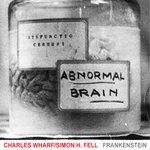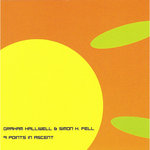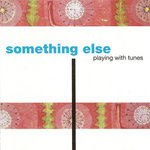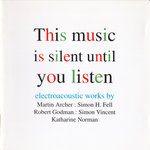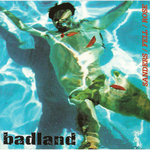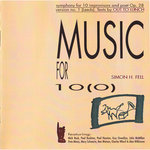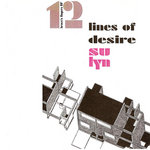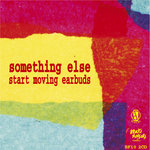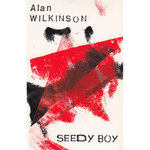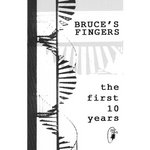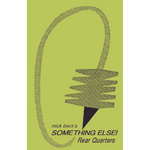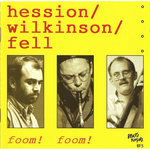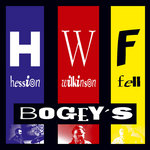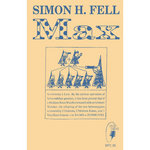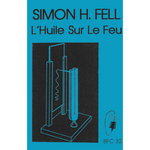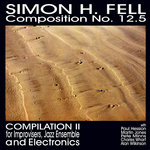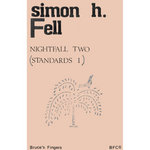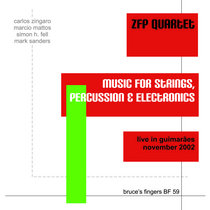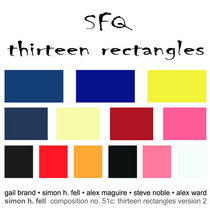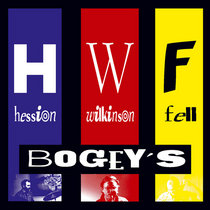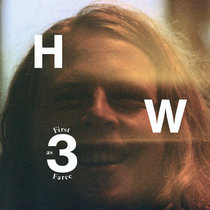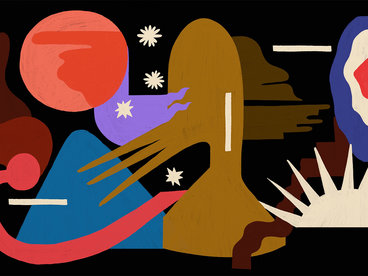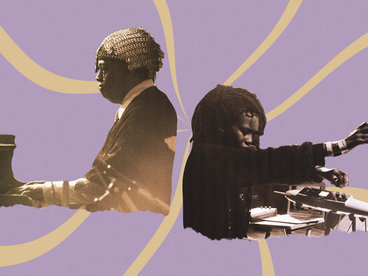
Responses, Reproduction & Reality
by London Improvisers Orchestra
-
Compact Disc (CD)2008 CD release, jewel box with 8-page booklet.
[Shipping prices are for airmail/priority delivery]ships out within 2 days€10.50 EUR or more
-
Compact Disc (CD)The same as the above, but without the jewel box.
If you have no need of the somewhat unloved and increasingly old-fashioned jewel box, we will send you the disc and all paper parts from the CD, without the plastic box.
The price is the same (we don't really need any more empty jewel boxes!), but it should offer you significant savings on shipping, especially if you order several discs and/or are outside Europe.ships out within 2 days€10.50 EUR or more
-
Subscription
Subscribe now to receive all the new music Bruce's Fingers creates, including 5 back-catalog releases, delivered instantly to you via the Bandcamp app for iOS and Android. You’ll also get access to subscriber-only exclusives. Learn more.Subscribe Now €20 EUR/year or more
1. |
|
about
The L.I.O. captured live at the Freedom Of The City Festivals in 2003 and 2004, with pieces by Dave Tucker, Caroline Kraabel, David Leahy, Pat Thomas, Philipp Wachsmann; includes Simon Fell's Composition No. 67: Improvisation Panels (1)
---------- press quotes ----------
"When a group of A-team improvisers gathered back in 1997 to perform Butch Morris' "London Skyscraper" tour, few probably thought that this would be a lasting proposition. But eight years later, this impressive pool of musicians continues to gather on a monthly basis at the north London Red Rose club to work out large-group strategies lead by various members of the collective. With full brass, strings, reeds, and percussion sections to work with, this gives the musicians unprecedented access to an ensemble of truly orchestral sonic range, all of whom are accomplished improvisers able to balance structure and spontaneity while bringing their own personal working methods to play. Simon Fell's Composition No. 67: Improvisation Panels (1) consists of a text-based score outlining general instructions for particular sonic events within the piece. Fell then used this score to conduct the ensemble, cueing the order of events, combinations of instruments, and dynamics. His mastery of structuring sound and silence comes out from the beginning, building up areas of growling trombone, glissed and plucked strings, and reed smears. Over the course of nine minutes, Fell contrasts sections of motion and stasis with blaring intensity and calm, creating one of the disc's highlights. Proceedings 6 is the free improvisation on this recording; but even here, it is clear that this is a group that has spent a significant amount of time working together. It is striking how symphonic the improvisation sounds as the piece develops in sections around the gathering forces of the ensemble's various parts. This was clearly honed playing pieces like Phil Wachsmann's Fantasy & Reality, which works abstract tone clusters across the ensemble, developing a slowly evolving form full of swirling detail and constantly wavering densities. Freedom of the City 2005 is rapidly approaching and one hopes that Martin Davidson will be there, steadfastly documenting the continuing development of this phenomenal collective." Michael Rosenstein ONE FINAL NOTE
"The LIO plays monthly at a venue called the Red Rose, more often than many celebrated small groups, certainly often enough to ensure that it sounds genuinely orchestral whilst implementing dramatically different strategies. Never more so than on Simon Fell's conduction, which bears the paradoxical name Composition No. 67: Improvisation Panels (1), and proceeds so inevitably that one might think it was completely scored. No one will get that notion from Hearing Reproduction 5, in which Caroline Kraabel bids the orchestra to exactly imitate the utterances of last-minute recruit Jaap Blonk (he was in the audience). Give 'em credit, they never flinch, and the results overcome my usually severe reservations about improvising vocalists. But my favorite moment comes from the uncharacteristically expressionistic introduction to Ism, in which conductor Pat Thomas induces saxophonist John Butcher to ride the surf of three energetic drummers." Bill Meyer SIGNAL TO NOISE
"There is not a single disappointment here, as each piece extensively explores and exploits the possibilities offered by this magnificent improvisers' pool. Dave Tucker, Simon H. Fell, Caroline Kraabel, David Leahy, Pat Thomas and Philipp Wachsmann take turns conducting the behemoth, sometimes using creative forms of scores, at other times simply moulding the sound matter in the heat of the moment. Opening the program, Tucker's Wit's End features an instrument this reviewer had personally never heard in a free improv context yet: the steel pan, played by Orphy Robinson in an eventful controlled chaos of a piece that has nothing to do with the Caribbean. Fell's Improvisation Panels (1) provides a nice textural moment. Kraabel has been contributing game-like pieces ever since the group's first recording; her Hearing Reproduction 5 asks from the musicians to reproduce as precisely as possible the sounds of the featured soloist, the arguably inimitable vocalist Jaap Blonk, and the results are hilarious. Wachsmann's Fantasy and Reality may follow more serious guidelines, but it turns out to be a highly entertaining piece, rich in sharp contrasts, odd instrument pairings and simply fascinating group playing. Responses, Reproduction & Reality may be the best place to start in the LIO's discography. It synthesizes all the qualities found in the previous albums." François Couture ALL-MUSIC GUIDE
"The LIO is a phenomenon that's worth documenting in itself, as an index of depth and diversity of improvising musicians in the city at present. Intriguing for example to hear BJ Cole's pedal steel glimmering through the 2004 grouping. And the music is, as ever, full of interest as ways are found to organise collective expression out of an assembly of 30 uncompromisingly independent players. Conducting is Butch Morris's legacy to the ensemble, individuals taking turns to impose degrees of regulation, shaping and monitoring the large group's mobility and density through actions, ideas and even scores. For all that, the track that on initial listening has most appeal is Proceeding 6, freely improvised within its own unambiguous terms of reference. Then again, maybe the discipline of being orchestrated through conduction reverberates through that effective piece of instant composing." Julian Cowley THE WIRE
"With over thirty musicians, the orchestra's creative ways are partly signified by call and response dialogues, layered horns, and multicoloured contrasts. Effectively, the artists pursue a stop/start and regenerative process via a community-minded approach. Speckling their notes with stabs at humour and wit, the musicians also pursue brash cadenzas with asymmetrical percussion grooves. Yet the instrumentalists are apt to splinter off into sub-themes. Part of the fun resides within the fact that they don't always perform as a group. It's akin to a theatrical component, where actors enter and exit a given scene. On Responses, the horns section evokes a sense of yearning, while on Fantasy and Reality, the overall muse is marked by weaving horns and subliminal exchanges, like Evan Parker's oscillating soprano sax lines. Nonetheless, they render a gamut of emotive qualities, as many of us have come to expect. And it's another cleverly articulated entry into this unit's gravitating sequence of musical revelations." Glenn Astarita ALL ABOUT JAZZ
"Outgrowth of a Butch Morris-led conduction that took place in London a few years ago, the London Improvisers Orchestra (LIO) has evolved into a once-a-month gig where some of the British capital's best improvisers get together to try out new ideas. Involving a revolving cast of 30-plus players as well as different conductors and composers, the LIO has taken on an identity far beyond that of a BritImprov kicks band. Ism, conducted by electronic manipulator Pat Thomas, could almost be Free Jazz. Here the creative shape revolves around tenor saxophonist John Butcher's winnowing slurs and smears plus trombonist Alan Tomlinson's pedal-point plunger blasts and snorts, rather than the agitato overtones from the massed instruments around them. Including hyper-kinetic piano cadences at the finale, polyphonic string crescendos as well as triple counterpoint from the drums, the orchestra's most important function is as a framing device. Wit's End, conducted by Dave Tucker - which in many ways begins as a concerto for Paul Rutherford's trombone - develops in a similar fashion. Moving among harsh vamps from the horns and percussion, the trombonist shuffles and smears his timbres, later vocalizing to match the oscillations from B. J. Cole's pedal steel guitar. Other influences surface as the almost-12½-minute composition develops, most noticeably the avant spin Orphy Robinson gives the traditional steel pan and the wave forms bouncing from interference to accompaniment from Adam Bohman's so-called amplified objects. More conventionally, the LIO here includes legato orchestral string parts that only touch on dissonance and some call-and-response riffs from soprano saxophonist Tom Chant and trumpeter Roland Ramanan. By replicating writ large the gullet gymnastics of guest vocalist Jaap Blonk, from the Netherlands, Hearing Reproduction 5 - conducted by Caroline Kraabel - impresses as well. Spiccato string stops, hocketing irregular horn lines, aviary squeaks from the flutes and blacksmith-like thumps from the percussionists match if not mirror the retching, growling, barking and throat gurgles that characterize Blonk's sound." Ken Waxman JAZZWORD
---------- press quotes ----------
"When a group of A-team improvisers gathered back in 1997 to perform Butch Morris' "London Skyscraper" tour, few probably thought that this would be a lasting proposition. But eight years later, this impressive pool of musicians continues to gather on a monthly basis at the north London Red Rose club to work out large-group strategies lead by various members of the collective. With full brass, strings, reeds, and percussion sections to work with, this gives the musicians unprecedented access to an ensemble of truly orchestral sonic range, all of whom are accomplished improvisers able to balance structure and spontaneity while bringing their own personal working methods to play. Simon Fell's Composition No. 67: Improvisation Panels (1) consists of a text-based score outlining general instructions for particular sonic events within the piece. Fell then used this score to conduct the ensemble, cueing the order of events, combinations of instruments, and dynamics. His mastery of structuring sound and silence comes out from the beginning, building up areas of growling trombone, glissed and plucked strings, and reed smears. Over the course of nine minutes, Fell contrasts sections of motion and stasis with blaring intensity and calm, creating one of the disc's highlights. Proceedings 6 is the free improvisation on this recording; but even here, it is clear that this is a group that has spent a significant amount of time working together. It is striking how symphonic the improvisation sounds as the piece develops in sections around the gathering forces of the ensemble's various parts. This was clearly honed playing pieces like Phil Wachsmann's Fantasy & Reality, which works abstract tone clusters across the ensemble, developing a slowly evolving form full of swirling detail and constantly wavering densities. Freedom of the City 2005 is rapidly approaching and one hopes that Martin Davidson will be there, steadfastly documenting the continuing development of this phenomenal collective." Michael Rosenstein ONE FINAL NOTE
"The LIO plays monthly at a venue called the Red Rose, more often than many celebrated small groups, certainly often enough to ensure that it sounds genuinely orchestral whilst implementing dramatically different strategies. Never more so than on Simon Fell's conduction, which bears the paradoxical name Composition No. 67: Improvisation Panels (1), and proceeds so inevitably that one might think it was completely scored. No one will get that notion from Hearing Reproduction 5, in which Caroline Kraabel bids the orchestra to exactly imitate the utterances of last-minute recruit Jaap Blonk (he was in the audience). Give 'em credit, they never flinch, and the results overcome my usually severe reservations about improvising vocalists. But my favorite moment comes from the uncharacteristically expressionistic introduction to Ism, in which conductor Pat Thomas induces saxophonist John Butcher to ride the surf of three energetic drummers." Bill Meyer SIGNAL TO NOISE
"There is not a single disappointment here, as each piece extensively explores and exploits the possibilities offered by this magnificent improvisers' pool. Dave Tucker, Simon H. Fell, Caroline Kraabel, David Leahy, Pat Thomas and Philipp Wachsmann take turns conducting the behemoth, sometimes using creative forms of scores, at other times simply moulding the sound matter in the heat of the moment. Opening the program, Tucker's Wit's End features an instrument this reviewer had personally never heard in a free improv context yet: the steel pan, played by Orphy Robinson in an eventful controlled chaos of a piece that has nothing to do with the Caribbean. Fell's Improvisation Panels (1) provides a nice textural moment. Kraabel has been contributing game-like pieces ever since the group's first recording; her Hearing Reproduction 5 asks from the musicians to reproduce as precisely as possible the sounds of the featured soloist, the arguably inimitable vocalist Jaap Blonk, and the results are hilarious. Wachsmann's Fantasy and Reality may follow more serious guidelines, but it turns out to be a highly entertaining piece, rich in sharp contrasts, odd instrument pairings and simply fascinating group playing. Responses, Reproduction & Reality may be the best place to start in the LIO's discography. It synthesizes all the qualities found in the previous albums." François Couture ALL-MUSIC GUIDE
"The LIO is a phenomenon that's worth documenting in itself, as an index of depth and diversity of improvising musicians in the city at present. Intriguing for example to hear BJ Cole's pedal steel glimmering through the 2004 grouping. And the music is, as ever, full of interest as ways are found to organise collective expression out of an assembly of 30 uncompromisingly independent players. Conducting is Butch Morris's legacy to the ensemble, individuals taking turns to impose degrees of regulation, shaping and monitoring the large group's mobility and density through actions, ideas and even scores. For all that, the track that on initial listening has most appeal is Proceeding 6, freely improvised within its own unambiguous terms of reference. Then again, maybe the discipline of being orchestrated through conduction reverberates through that effective piece of instant composing." Julian Cowley THE WIRE
"With over thirty musicians, the orchestra's creative ways are partly signified by call and response dialogues, layered horns, and multicoloured contrasts. Effectively, the artists pursue a stop/start and regenerative process via a community-minded approach. Speckling their notes with stabs at humour and wit, the musicians also pursue brash cadenzas with asymmetrical percussion grooves. Yet the instrumentalists are apt to splinter off into sub-themes. Part of the fun resides within the fact that they don't always perform as a group. It's akin to a theatrical component, where actors enter and exit a given scene. On Responses, the horns section evokes a sense of yearning, while on Fantasy and Reality, the overall muse is marked by weaving horns and subliminal exchanges, like Evan Parker's oscillating soprano sax lines. Nonetheless, they render a gamut of emotive qualities, as many of us have come to expect. And it's another cleverly articulated entry into this unit's gravitating sequence of musical revelations." Glenn Astarita ALL ABOUT JAZZ
"Outgrowth of a Butch Morris-led conduction that took place in London a few years ago, the London Improvisers Orchestra (LIO) has evolved into a once-a-month gig where some of the British capital's best improvisers get together to try out new ideas. Involving a revolving cast of 30-plus players as well as different conductors and composers, the LIO has taken on an identity far beyond that of a BritImprov kicks band. Ism, conducted by electronic manipulator Pat Thomas, could almost be Free Jazz. Here the creative shape revolves around tenor saxophonist John Butcher's winnowing slurs and smears plus trombonist Alan Tomlinson's pedal-point plunger blasts and snorts, rather than the agitato overtones from the massed instruments around them. Including hyper-kinetic piano cadences at the finale, polyphonic string crescendos as well as triple counterpoint from the drums, the orchestra's most important function is as a framing device. Wit's End, conducted by Dave Tucker - which in many ways begins as a concerto for Paul Rutherford's trombone - develops in a similar fashion. Moving among harsh vamps from the horns and percussion, the trombonist shuffles and smears his timbres, later vocalizing to match the oscillations from B. J. Cole's pedal steel guitar. Other influences surface as the almost-12½-minute composition develops, most noticeably the avant spin Orphy Robinson gives the traditional steel pan and the wave forms bouncing from interference to accompaniment from Adam Bohman's so-called amplified objects. More conventionally, the LIO here includes legato orchestral string parts that only touch on dissonance and some call-and-response riffs from soprano saxophonist Tom Chant and trumpeter Roland Ramanan. By replicating writ large the gullet gymnastics of guest vocalist Jaap Blonk, from the Netherlands, Hearing Reproduction 5 - conducted by Caroline Kraabel - impresses as well. Spiccato string stops, hocketing irregular horn lines, aviary squeaks from the flutes and blacksmith-like thumps from the percussionists match if not mirror the retching, growling, barking and throat gurgles that characterize Blonk's sound." Ken Waxman JAZZWORD
credits
released July 1, 2005
Harry Beckett, Roland Ramanan, Ian Smith: trumpets
Robert Jarvis, Paul Rutherford, Alan Tomlinson: trombones
Neil Metcalfe: flute
Catherine Pluygers: oboe
Terry Day: bamboo pipes
John Rangecroft: clarinet
Jacques Foschia, Harrison Smith: bass clarinets
Tom Chant, Lol Coxhill, Adrian Northover: soprano saxes
Caroline Kraabel: alto sax
John Butcher, Evan Parker: tenor saxophones
Susanna Ferrar, Sylvia Hallett, Philipp Wachsmann: violins
Charlotte Hug: viola
Marcio Mattos: 'cello
John Edwards, Simon H. Fell, David Leahy: double basses
Keith Rowe, Dave Tucker: electric guitars
B. J. Cole: pedal steel guitar
Steve Beresford, Veryan Weston: pianos
Orphy Robinson: steel pan
Tony Marsh, Louis Moholo-Moholo, Mark Sanders: drum sets
Adam Bohman, Pat Thomas: electronics
Jaap Blonk: voice
2003-04 (66 mins.) in jewel box
© Emanem 2005
full track listing:
01. Wit’s End [12m20s]
02. Improvisation Panels (1) [9m14s]
03. Hearing Reproduction 5 [6m38s]
04. Proceeding 6 [12m38s]
05. Responses [4m56s]
06. Ism [9m11s]
07. Fantasy And Reality [9m50s]
Harry Beckett, Roland Ramanan, Ian Smith: trumpets
Robert Jarvis, Paul Rutherford, Alan Tomlinson: trombones
Neil Metcalfe: flute
Catherine Pluygers: oboe
Terry Day: bamboo pipes
John Rangecroft: clarinet
Jacques Foschia, Harrison Smith: bass clarinets
Tom Chant, Lol Coxhill, Adrian Northover: soprano saxes
Caroline Kraabel: alto sax
John Butcher, Evan Parker: tenor saxophones
Susanna Ferrar, Sylvia Hallett, Philipp Wachsmann: violins
Charlotte Hug: viola
Marcio Mattos: 'cello
John Edwards, Simon H. Fell, David Leahy: double basses
Keith Rowe, Dave Tucker: electric guitars
B. J. Cole: pedal steel guitar
Steve Beresford, Veryan Weston: pianos
Orphy Robinson: steel pan
Tony Marsh, Louis Moholo-Moholo, Mark Sanders: drum sets
Adam Bohman, Pat Thomas: electronics
Jaap Blonk: voice
2003-04 (66 mins.) in jewel box
© Emanem 2005
full track listing:
01. Wit’s End [12m20s]
02. Improvisation Panels (1) [9m14s]
03. Hearing Reproduction 5 [6m38s]
04. Proceeding 6 [12m38s]
05. Responses [4m56s]
06. Ism [9m11s]
07. Fantasy And Reality [9m50s]
license
all rights reserved
tags
about
Bruce's Fingers Saint Dizier Leyrenne, France
Bruce's Fingers is a record label founded in 1983 by bassist, composer & improviser Simon H. Fell.
The label's
publications (which also include books and scores) are centred around free / contemporary jazz, improvised music & contemporary / experimental composition.
Initially focussed on Fell's own work, the BF project has since expanded to include many other things besides...
... more
discography
-
Mar 2020
-
Mar 2020
-
Mar 2020
-
Feb 2020
-
Mar 2019
-
Jan 2019
-
Oct 2018
-
Sep 2018
-
Mar 2018
-
Mar 2018
-
Dec 2017
-
Nov 2017
-
Dec 2016
-
Dec 2016
-
Dec 2016
-
Dec 2016
-
Oct 2015
-
Oct 2015
-
Oct 2015
-
Aug 2015
-
Aug 2015
-
Mar 2015
-
Nov 2014
-
Oct 2014
-
Sep 2014
-
Jul 2014
-
Feb 2014
-
Oct 2013
-
Sep 2013
-
Jun 2013
-
Jun 2013
-
Jan 2013
-
Jan 2013
-
Aug 2012
-
Jan 2012
-
Oct 2011
-
Oct 2011
-
Aug 2011
-
Dec 2009
-
Jul 2009
-
Dec 2008
-
Oct 2008
-
Dec 2007
-
Jul 2007
-
Jul 2007
-
Apr 2007
-
Nov 2006
-
May 2006
-
Mar 2006
-
Oct 2005
-
Sep 2005
-
Sep 2005
-
Aug 2005
-
Jul 2005
-
Jul 2005
-
Jul 2005
-
Dec 2004
-
Jul 2004
-
Jan 2004
-
Dec 2003
-
Jul 2003
-
Jun 2003
-
Dec 2002
-
Oct 2002
-
Jun 2002
-
Jun 2002
-
Jun 2002
-
May 2002
-
May 2002
-
Oct 2001
-
Aug 2001
-
Jun 2001
-
Sep 2000
-
Sep 2000
-
Mar 2000
-
Sep 1999
-
Dec 1998
-
Dec 1998
-
Nov 1998
-
Jul 1998
-
May 1998
-
Apr 1998
-
Mar 1997
-
Dec 1996
-
May 1996
-
Aug 1995
-
Jul 1995
-
Nov 1994
-
Aug 1994
-
Apr 1993
-
Nov 1992
-
Aug 1992
-
Sep 1991
-
Aug 1991
-
Jan 1991
-
Mar 1990
-
Jul 1986
contact / help
Bruce's Fingers recommends:
If you like Responses, Reproduction & Reality, you may also like:
